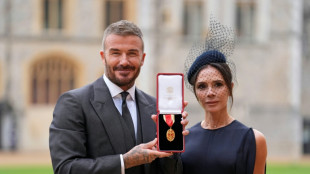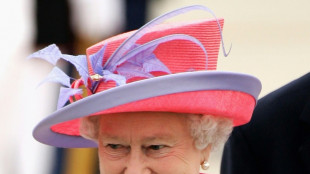
-
 Scandic Trust Group strengthens sales network with First Idea Consultant
Scandic Trust Group strengthens sales network with First Idea Consultant
-
France urges EU to sanction Shein platform

-
 France opt for Le Garrec as Dupont replacement for South Africa Test
France opt for Le Garrec as Dupont replacement for South Africa Test
-
Turmoil in tiaras at Miss Universe pageant in Thailand
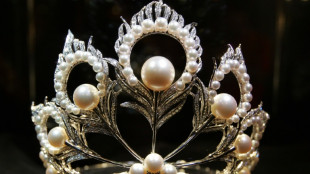
-
 Probe into Thales defence group looking at Indonesian contract
Probe into Thales defence group looking at Indonesian contract
-
US to cancel flights as longest govt shutdown drags on

-
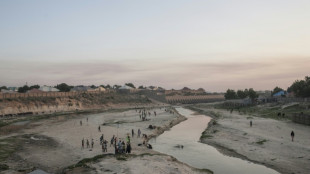 Home in Nigeria, ex-refugees find themselves in a war zone
Home in Nigeria, ex-refugees find themselves in a war zone
-
Doncic's Lakers hold off Wembanyama's Spurs, Blazers silence Thunder

-
 For Turkey's LGBTQ community, draft law sparks existential alarm
For Turkey's LGBTQ community, draft law sparks existential alarm
-
Musk's $1 trillion pay package to face Tesla shareholder vote

-
 Tonga rugby league star out of intensive care after seizure
Tonga rugby league star out of intensive care after seizure
-
Argentine ex-president Kirchner goes on trial in new corruption case

-
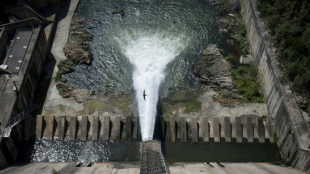 Dams, housing, pensions: Franco disinformation flourishes online
Dams, housing, pensions: Franco disinformation flourishes online
-
Endo returns as Japan look to build on Brazil win

-
 Franco captivates young Spaniards 50 years after death
Franco captivates young Spaniards 50 years after death
-
German steel industry girds for uncertain future
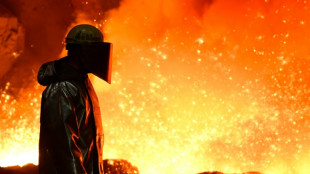
-
 IPL champions Bengaluru could be sold for 'as much as $2 billion'
IPL champions Bengaluru could be sold for 'as much as $2 billion'
-
Budget impasse threatens Belgium's ruling coalition

-
 New Zealand ex-top cop admits to having material showing child abuse, bestiality
New Zealand ex-top cop admits to having material showing child abuse, bestiality
-
BoE set for finely balanced pre-budget rate call

-
 Australian kingpin obtains shorter sentence over drug charge
Australian kingpin obtains shorter sentence over drug charge
-
Weatherald's unenviable Ashes task: fill giant hole at top left by Warner

-
 Ovechkin first to score 900 NHL goals as Capitals beat Blues
Ovechkin first to score 900 NHL goals as Capitals beat Blues
-
On Mexico City's streets, vendors fight to make it to World Cup

-
 Asian markets bounce from selloff as US jobs beat forecasts
Asian markets bounce from selloff as US jobs beat forecasts
-
Philippine death toll tops 140 as typhoon heads towards Vietnam

-
 Kyrgios targets 'miracle' Australian Open return after knee improves
Kyrgios targets 'miracle' Australian Open return after knee improves
-
'AI president': Trump deepfakes glorify himself, trash rivals

-
 Belgium probes drone sightings after flights halted overnight
Belgium probes drone sightings after flights halted overnight
-
Five things to know about 'forest COP' host city Belem

-
 World leaders to rally climate fight ahead of Amazon summit
World leaders to rally climate fight ahead of Amazon summit
-
Engine fell off US cargo plane before deadly crash: officials

-
 Mexican leader calls for tougher sexual harassment laws after attack
Mexican leader calls for tougher sexual harassment laws after attack
-
Meghan Markle set for big screen return: reports

-
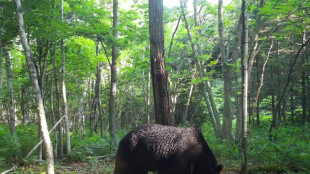 Japan deploys troops after wave of deadly bear attacks
Japan deploys troops after wave of deadly bear attacks
-
FIFA announce new peace prize to be awarded at World Cup draw in Washington

-
 Australia's Cummins hints at return for second Ashes Test
Australia's Cummins hints at return for second Ashes Test
-
Boeing settles with one plaintiff in 737 MAX crash trial

-
 Man City win as Inter stay perfect, Barca held in Champions League
Man City win as Inter stay perfect, Barca held in Champions League
-
French superstar DJ Snake wants new album to 'build bridges'

-
 Barca rescue draw at Club Brugge in six-goal thriller
Barca rescue draw at Club Brugge in six-goal thriller
-
Foden hits top form as Man City thrash Dortmund

-
 NBA officials brief Congress committee over gambling probe
NBA officials brief Congress committee over gambling probe
-
Inter beat Kairat Almaty to maintain Champions League perfection

-
 Newcastle sink Bilbao to extend Champions League winning run
Newcastle sink Bilbao to extend Champions League winning run
-
Wall Street stocks rebound after positive jobs data

-
 LPGA, European tour partner with Saudis for new Vegas event
LPGA, European tour partner with Saudis for new Vegas event
-
Eyes turn to space to feed power-hungry data centers

-
 Jazz lose Kessler for season with shoulder injury
Jazz lose Kessler for season with shoulder injury
-
League scoring leader Messi among MLS Best XI squad


Whale menopause sheds light on human evolutionary mystery
Why do humans experience menopause? It's a question that some women going through the symptoms might have asked themselves more than once.
Scientists are also baffled. From an evolutionary perspective, animals generally take every chance they can get to have as many offspring as possible to boost their odds of survival.
So why have some species evolved to have menopause, in which females live many years after they stop being able to reproduce?
That there are so few other examples in the animal kingdom only deepens the mystery.
Out of 5,000 mammals, just five species of whales with teeth -- including killer whales, beluga whales and narwhals -- are the only others known to have females that regularly live long after they stop reproducing.
However plenty of other toothed whales, such as dolphins, do not experience menopause.
By looking at the differences between these two groups, a UK-led team of researchers sought to discover why some whales evolved to get menopause -- and what this could tell us about ourselves.
Despite our many differences, humans share a "convergent life history" with these ocean giants that led to the independent evolution of menopause, the researchers concluded in a study published in Nature on Wednesday.
Their results tied together several existing hypotheses. The first piece of the puzzle involving lifespan.
- The grandmother hypothesis -
Females of the five species that have menopause live roughly 40 years longer than other similar-sized whales, the researchers found.
These female whales also easily outlive males of their own kind.
Female killer whales "regularly live into their 60s and 70s, but the males are all dead by 40," lead study author Samuel Ellis of the UK's University of Exeter told an online press conference.
This supports what is known as the "grandmother hypothesis" -- that older females care for their grandchildren, therefore helping their species survive in a different way.
But why would it be an evolutionary advantage for these grandmothers to stop having offspring?
"The second part of this story is about competition," study co-author Darren Croft said.
When killer whale "mothers and daughters try and breed at the same time, the calves of the older females" have a significantly lower survival rate as they compete for resources, he said.
"So they have evolved a longer lifespan while keeping a short reproductive lifespan," Croft added.
"This is just the same pattern of life history we see in humans."
Though we walk on land and they swim through the ocean, the similarities between human and whale social structures is "absolutely striking", Croft said.
- The importance of matriarchy -
"Older matriarchs" play an important role within both societies, he said.
For example, the experience older females have gathered over their lives helps the whale families get through hard times such as environmental challenges or a lack of food.
But just having a matriarchal society is not enough. Older female elephants, for example, look after their offspring but keep reproducing until the end of their lives.
The key difference could be that older whale mothers keep looking after their sons, Croft said. Young male elephants, however, leave the family group.
Both sons and daughters sticking around could even be a unique trait to the five whales -- and humans -- that get menopause, he speculated.
Rebecca Sear, an evolutionary demographer and anthropologist at the London School of Hygiene and Tropical Medicine not involved in the study, cautioned that this could not "provide definitive answers to the question of why menopause evolved".
Whales are incredibly difficult to study, and a lot of the data used for the research was from unnatural events such as mass strandings, she commented in Nature.
Meanwhile, there has been increasing criticism that menopause in human women remains badly under-researched due to a long-standing male-skewed bias in medical research.
"Human grandmothers, like whale grandmothers, are important in the lives of their adult children and grandchildren, but older women are too often ignored in policy circles and public health research," Sear said.
E.Aziz--SF-PST


